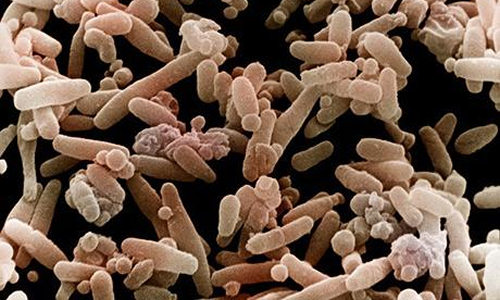As scientists catalog the trillions of bacteria found in every nook and cranny of the human body, a new look by the University of Michigan shows wide variation in the types of bacteria found in healthy people.
Organelles in human cells are believed to have started life as free-swimming microbes Photo Credits: Science Photo Library via Telegraph
Based on their findings in today’s Nature, there is no single healthy microbiome. Rather each person harbors a unique and varied collection of bacteria that’s the result of life history as well their interactions with the environment, diet and medication use.
“Understanding the diversity of community types and the mechanisms that result in an individual having a particular type or changing types will allow us to use their community type to assess disease risk and to personalize their medical care,” says lead study author Patrick D. Schloss, Ph.D., associate professor of microbiology and immunology at the U-M Medical School.
Additional findings reveal bacteria can be grouped into community types that are predictive of each other.
“What was unexpected was that it was possible to predict the type of community a person had in their gastrointestinal track based on the community in their mouth,” Schloss explains. “This was possible even though the types of bacteria are very different in the two sites.”
The Human Microbiome Project is the movement to understand how changes in the microbiome are associated with changes in health.
More than 200 scientists in the HMP consortium spent five years analyzing samples from nearly 300 healthy adults. The samples came from 18 different places on their bodies, including their mouths, noses, guts, behind each ear and inside each elbow.
Schloss and co-author Tao Ding, Ph.D, revealed it is possible to associate a limited amount of data from the subjects with their community type. Whether a person was breastfed was associated with their gut community type, level of education was associated with the vaginal community type, and one’s gender affected several body types as well.
For the study, U-M researchers were not able to associate any of the changes in community type with changes in health.
“What our data shows is that just because a person’s microbiome is different doesn’t make it unhealthy,” says Schloss. “It demonstrates there’s more to learn about the factors that cause one’s microbiome to change.”
Understanding why community types change will be useful in developing therapies that can alter one’s community type using pre- and probiotics, fecal transplants or antibiotics. The analysis described in this study was supported by grants from the National Institutes of Health that leads the Human Microbiome Project.
Story Source:
The above story is based on materials provided by University of Michigan Health System, Shantell Kirkendoll.





